| Srl | Item |
| 1 |
ID:
104431
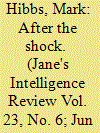

|
|
|
| 2 |
ID:
137235
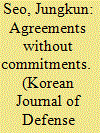

|
|
|
|
|
| Summary/Abstract |
Twenty years after the deal struck between the United States and North Korea over the nuclear crisis, the security environment on the Korean Peninsula remains unstable. When it comes to the U.S.-North Korea Agreed Framework from 1994 through 2002, previous research has paid scant attention to how the U.S. Congress responded to President Clinton’s accord with the Pyongyang regime. This article
provides a rare empirical assessment of what led America’s lawmakers to uphold or overturn the executive agreements with North Korea. The bottom-line finding is that politics hardly stops at the water’s edge, with “politics-as-usual” forces such as partisan conflicts ultimately having derailed Congressional commitments to the U.S.-DPRK accords. The results shed light on how and why domestic politics often redirects the course of international agreements, particularly in the era of
polarized politics.
|
|
|
|
|
|
|
|
|
|
|
|
|
|
|
|
| 3 |
ID:
052971
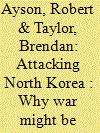

|
|
|
|
|
| Publication |
Jul-Sep 2004.
|
|
|
|
|
|
|
|
|
|
|
|
|
|
|
|
| 4 |
ID:
105109
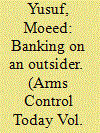

|
|
|
| 5 |
ID:
065034
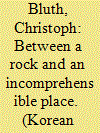

|
|
|
| 6 |
ID:
073604


|
|
|
| 7 |
ID:
074230
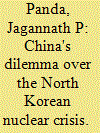

|
|
|
| 8 |
ID:
074998
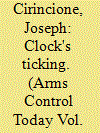

|
|
|
| 9 |
ID:
178453
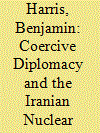

|
|
|
|
|
| Summary/Abstract |
Coercive diplomacy was utilized by a coalition of the United States, United Kingdom, France, Russia, China and Germany (collectively known as the P5+1) to negotiate an end to the Iranian nuclear crisis from 2002–2013. Eventually, this approach culminated in the Geneva interim agreement and the Joint Comprehensive Plan of Action in November 2013 and October 2015, respectively. This article charts the course of the P5+1’s coercive diplomacy efforts against Iran and demonstrates that coercive diplomacy pressured Iran to a point where the cost of continued resistance was too high to continue enduring. It shows that a combination of factors succeeded after 11 years of a coercive diplomacy strategy. These findings will have implications for policymaking and academia, as it is a rare illustration of successful, coalitional coercive diplomacy.
|
|
|
|
|
|
|
|
|
|
|
|
|
|
|
|
| 10 |
ID:
130547
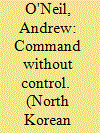

|
|
|
|
|
| Publication |
2014.
|
| Summary/Abstract |
Purpose-To assess the prospects for managing crises on the Korean Peninsula.
Design/methodology/approach-this article investigates North Korea's nuclear behavior using theories of crisis instability, which focus on the actual or perceived incentives of a nuclear weapon state to strike first during a crisis. Findings-Pyongyang's embryonic command and control capabilities mean that rapid escalation to full-scale conflict is a greater prospect than generally acknowledged. Practical implications-This raises questions about the ability of protagonists to avoid escalation resulting from miscalculation in future crises on the Korean Peninsula and has implications for policy makers in devising strategies to deter North Korea from undertaking behavior that risks escalation while reassuring elites in Pyongyang.
|
|
|
|
|
|
|
|
|
|
|
|
|
|
|
|
| 11 |
ID:
095630
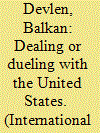

|
|
|
| 12 |
ID:
061221
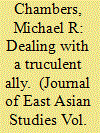

|
|
|
|
|
| Publication |
Jan-Apr 2005.
|
| Summary/Abstract |
Fearing war on the Korean peninsula as a result of the current nuclear crisis, China has attempted to restrain its risk-taking ally in North Korea and push it toward a negotiated solution. In the process, Beijing has reneged on security commitments made in its bilateral alliance with Pyongyang. We should not be surprised by this behavior because China has acted similarly in other alliances with Asian neighbors. In particular, the PRC has demonstrated a wariness of being dragged into unwanted conflicts, has (since the economic reforms began in 1978) placed its own strategic economic development interests over fulfilling security pledges to allies, and has taught unruly allies a lesson for defying Chinese interests and advice by allowing them to be bloodied in combat. China's refusal to honor its security commitments in order to restrain North Korea and avoid entrapment in an undesired war raises the issue of the future of this alliance.
|
|
|
|
|
|
|
|
|
|
|
|
|
|
|
|
| 13 |
ID:
115402
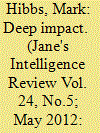

|
|
|
| 14 |
|
| 15 |
ID:
133405
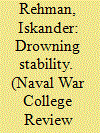

|
|
|
|
|
| Publication |
2012.
|
| Summary/Abstract |
In May 1998, the sun-scorched deserts of the Indian state of Rajasthan shook with a succession of nuclear explosions. Barely two weeks later, in a seemingly tit-for-tat response, Pakistan conducted its own series of detonations, in the remote western hills of Baluchistan. Both nations' previously concealed nuclear capabilities had suddenly burst out into the open, giving a new and terrifying form to the enduring rivalry that had convulsed the subcontinent for decades. Caught off guard, the international community reacted with indignation and dismay. Concerns over nuclear escalation in the event of another Indo-Pakistani conflict refocused Washington's attention on South Asia and triggered the longest sustained level of bilateral Indo-American engagement in history. This had the unexpected benefit of enabling both democracies finally to find common ground, after many years of acrimony, chronic mistrust, and squandered opportunities. Fears of mass terrorism in the wake of 9/11 and subsequent revelations of extensive proliferation emanating from Pakistan added urgency to Western desires to preserve a modicum of crisis stability in South Asia, as well as to prevent any form of escalatory behavior that could spiral into nuclear conflict or further the spread of radioactive material.
|
|
|
|
|
|
|
|
|
|
|
|
|
|
|
|
| 16 |
ID:
075466
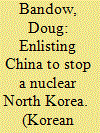

|
|
|
| 17 |
ID:
082910
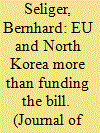

|
|
|
| 18 |
ID:
148239
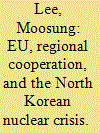

|
|
|
|
|
| Summary/Abstract |
North Korea poses a security threat by developing nuclear weapons. To address this source of regional insecurity, institutionalized frameworks of regional cooperation have been employed. Despite its usefulness as an alternative route to deal with the North Korean case, controversies still remain in terms of its relevance and effectiveness. Even so, the regional integration, consistently promoted by the EU as an integral part of its Asian policy, still requires systematic evaluation. This paper thus examines how and under which conditions regional integration can make a contribution to the transformation of the current crisis. In answering this question, it concludes that a long-term model-setting effect is hard to disregard, in spite of the mixed view of substantial compulsory and social learning effects. The underlying reasons are the ontological-seeking activities of North Korea, along with regional and global actors’ reservations about the contributions of the EU as a key security provider in Asian affairs and in its promotion of the regional integration scheme.
|
|
|
|
|
|
|
|
|
|
|
|
|
|
|
|
| 19 |
ID:
123885
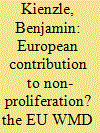

|
|
|
|
|
| Publication |
2013.
|
| Summary/Abstract |
In the aftermath of the ruptures caused by the Iraq crisis, European states agreed in December 2003 on both a European Security Strategy and an EU Strategy against the Proliferation of Weapons of Mass Destruction (WMD).
Ten years have passed since this attempt to kick-start common European policies on WMD proliferation. How well have EU policies performed in this area? Has a specifically European way of dealing with proliferation challenges emerged?
This article traces the development of EU policies on WMD proliferation since 2003 by examining, in particular, European reactions to the nuclear crisis in Iran, as well as European interactions with the international non-proliferation regime and the cooperation with partner countries. The article concludes that the EU has performed much better than might have been expected in an area that has traditionally been one of the fiercely guarded prerogatives of national security policies.
The EU's good performance is very much related to institutional flexibility, as exemplified by the EU/E3 approach to Iran, and to a high degree of political pragmatism. However, important shortcomings remain, most notably the lack of coordination between national and European non-proliferation efforts. In other words, the EU has not in the last 10 years turned into a fully fledged non-proliferation actor that can deliver tangible results in any area of proliferation concern.
|
|
|
|
|
|
|
|
|
|
|
|
|
|
|
|
| 20 |
ID:
074662
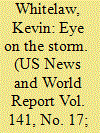

|
|
|